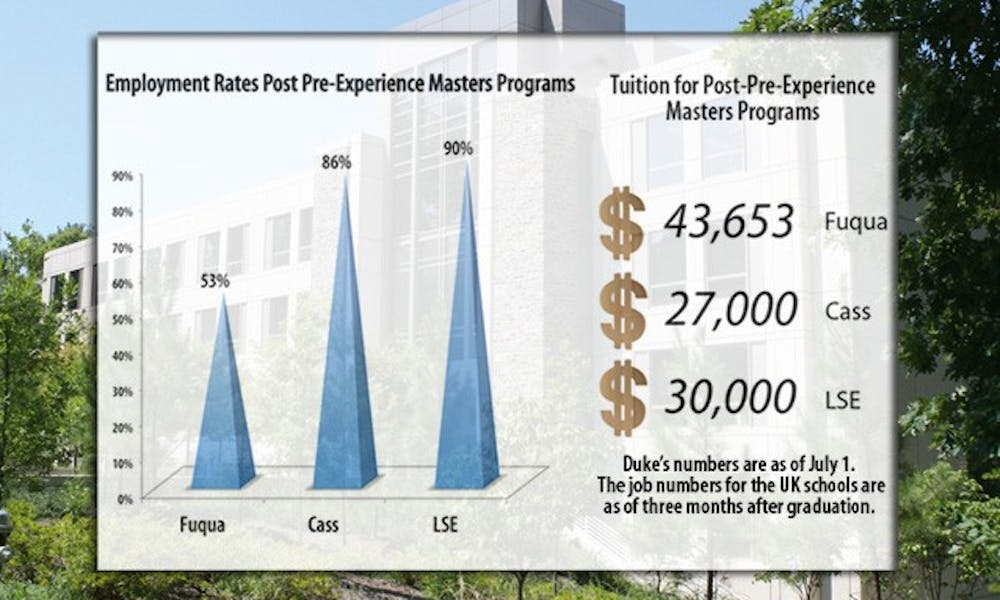The Fuqua School of Business’s Master of Management Studies program has added an extra term after an initial year that exceeded Duke’s expectations and saw more than half of graduates receive a full-time job offer by July.
The program, which targets recent graduates with a limited business background, made the changes so that students with any undergraduate major could come to Fuqua and be successful, said Kathie Amato, associate dean for the program.
“The students that we had were absolutely phenomenal and incredibly helpful in terms of helping us frame this new program,” Amato said. “And in terms of the jobs they have gone on to post-graduation, I’ve been very pleased there as well.”
Of the 92 graduates searching for employment, 49, or 53 percent, received at least one job offer and 7, or 8 percent, were offered an internship as of July 1, according to a Sept. 14 Fuqua news release.
Fuqua is one of the few schools in the U.S. to offer a one-year, pre-experience masters, which is designed to prepare students for an entry level finance, marketing or consulting job. The model is better established in Europe, where the top four programs in the United Kingdom reported employment rates three months after graduation of at least 86 percent, according to data compiled by the Financial Times. Final job numbers for the 2010 MMS class will be reported in the middle of this month, Amato said.
Of Duke’s undergraduate Class of 2010, 45 percent left with a job, and another 6 percent with an internship or fellowship, according to the Career Center website. Those numbers do not include students who went to graduate school.
The MMS program, which was approved on a three-year pilot basis last year, has been expanded to 15 courses over five six-week terms. In its first year, the MMS program consisted of 12 courses taken over four six-week terms. The curriculum, which is designed to compete with top programs in Europe, is focused on applied casework instead of theory, said Angela Eberts, associate program director of career services, who previously worked in product management and marketing for JPMorgan Chase & Co.
The program’s cost is tied to the University’s undergraduate tuition, which is currently $43,653. There was not an increase for this year’s added term, Amato said. The program costs at least $10,000 more than the two top U.K.-based programs. The London School of Economics and Political Science’s offering, which has a 90 percent employment rate for its 2010 class, costs approximately $30,000. City University London’s Cass Business School charges approximately $27,000 for its Masters in Management program, which has an employment rate of 86 percent for its 2010 class.
Graduating from Fuqua’s MMS program is a way for students to differentiate themselves in a crowded job market, said Geoff Robinson, the head of investment banking for 7city Learning, a financial services training company whose clients include Citigroup and Morgan Stanley. Additionally, the Fuqua brand draws the attention of selective companies, he said. Last year’s graduates received offers from both of those banks and from companies such as Accenture, American Express and Apple.
“One of the hardest things for guys coming into finance at the moment is differentiating themselves,” he said. “There seems to be so much high-quality talent floating around anything anyone can do to differ is worth thinking about.”
Since one-year pre-experience masters programs are not common in the U.S., Fuqua had to educate prospective employers about the program through a direct mail and e-mail campaign, Amato said. Additionally, members of last year’s class said more recruiting events should be offered for the MMS program.
“I know a lot of my classmates had issues with career services and on-campus recruiting,” said Brendan Fitzgerald, Trinity ’09, who now works for Soccer United Marketing. “Any time there was on-campus recruiting, we were stuck going to the undergraduate ones. We couldn’t go to MBA ones, and there was nothing tailored specifically for the MMS program.”
This year, in addition to a Spring career fair organized by the MMS program and open to all Duke students, career services have been further integrated into the MMS curriculum, Eberts said. The revamped business communication course offered in the first term prepares students for the Fall career search, and students now have mandatory appointments with the program’s three career coaches.
The makeup of the program has changed along with the curriculum. Last year, 60 of the 98 students did their undergraduate work at Duke. This year, the ratio is 21 out of 101 students, with more of the class coming from overseas, Amato said.
Get The Chronicle straight to your inbox
Signup for our weekly newsletter. Cancel at any time.

